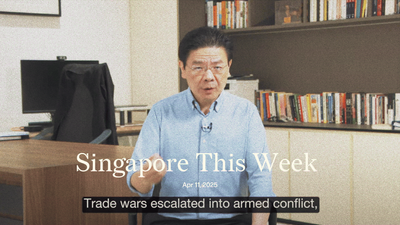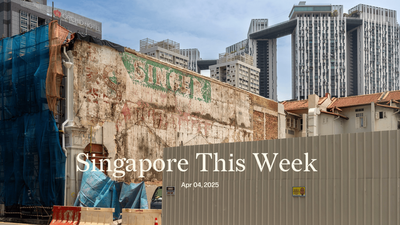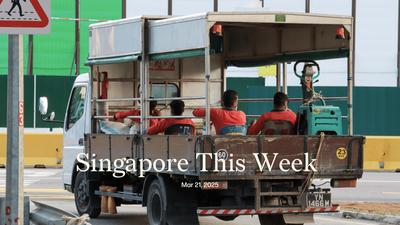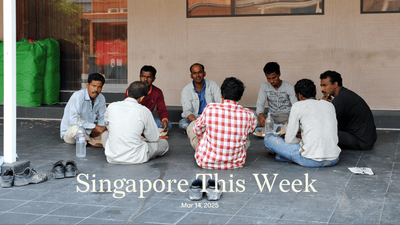Politics: Heart in the right place
In June this year, Lawrence Wong, deputy prime minister and presumed next leader of the ruling People’s Action Party (PAP), shared the broad outlines of “Forward Singapore”, his signature campaign. “I want to see a Singapore where opportunities are open to all, no matter who they are or what their background is…[where] everyone can chart their own path to live a fulfilling and dignified life…Where every man and woman is valued, every child treasured, and every senior respected.” Wong, whose unconventional rise up the ranks has offered hope to others from non-elite schools, has repeated these mantras since. This week, he told economists and policy wonks that Singapore excessively prizes “head” work at the expense of “hands-on and heart work”. He pointed out the growing divergence in pay between technical, polytechnic and university graduates. Everybody from preschool teachers to caregivers, he believes, deserves higher pay and more established career pathways. Sceptics might roll their eyes at the latest social democratic vision from a party whose policies often reflect Social Darwinism and neoliberalism. Singapore’s hierarchical pay structures can be tempered only through serious government intervention, such as minimum wages. At the top end, ministers and senior civil servants have long insisted on millions in pay for their “head work”, influencing societal norms and values. Wong will need a strong heart to cut them.
Society: Hands-on work that doesn’t pay
On Tuesday, nine construction workers no longer willing to accept being unpaid took matters into their own hands, quietly and peacefully. They blocked the entrance and exit of a building in north-eastern Singapore, holding up signs demanding to be paid for alleged “debts owed” to them. Employer Zhengda Corporation confirmed that the “protest” was due to a payment dispute between the company and a subcontractor. The group is now assisting in police investigations. Their potential crime: “participating in a public assembly without a permit”; an offence that carries a fine of up to S$3,000, likely several times their monthly wage. Will the authorities also question the errant subcontractor? While common in the 1950s, public labour strikes and disputes are now rare in Singapore. The last strike took place in 2012, when 171 Chinese national bus drivers walked out of their jobs. Their action was immediately declared illegal with several being charged. In March 2019, over 30 foreign workers staged a sit-down protest at a work site, demanding answers about alleged unpaid salaries. And more recently, in September, the High Court dismissed all unfair work practice claims made by a former bus driver against employer SBS Transit. Despite growing public sympathy and support for the plight of low-wage workers, they still face the risk of being deported or fired for any sort of labour activism. That they persist shows how desperate they are, having probably exhausted all other avenues.
Society: Cardiac arrest?
If Singapore’s approach to drugs focussed more on harm reduction than criminalisation, Felicia Teo and her loved ones might not have faced such agony. In 2007, Teo, a 19-year-old student from the LASALLE College of Fine Arts, went missing. Her parents and friends searched for her, created a “FindFelicia” website, and put up “missing person” flyers. Police investigations turned up nothing—until 2020, when Ahmad Danial Mohamed Rafa'ee, a Singaporean, confessed that he and Ragil Putra Setia Sukmarahjana, an Indonesian still at-large, had covered up their crime. On June 30th, 2007, the three had gone to an apartment in Marine Terrace. They consumed Ecstasy. Teo died at around 6am due to unknown causes. In a society with a more enlightened approach to drugs, people in Ahmad and Ragil’s shoes would have likely called a hotline. But in Singapore, worried about getting caught taking drugs, Ahmad and Ragil put her body in a carton box (presumably after cutting it up) and took it to a deserted area in Punggol, where they burned it with kerosene. In 2010, a partial skull was found in Punggol, though its identity was then unknown. After Ahmad confessed to the crime in 2020, DNA testing confirmed it was Teo's. Last Friday, Ahmad was sentenced to 26 months in jail (most already served). We’ll never know if a different drug regime would have led to Teo’s life being saved. But it’s certain that her loved ones wouldn’t have had to wait 13 years for the truth—and only a partial skull.
Health: Just when you thought it was safe
The government has curtailed hospital visitation rights, and many people are wearing masks again. Lest we forget that we’re in the middle of a pandemic, Covid-19 (and all its mutations) will be sure to remind us. Singapore recorded 11,934 new cases on Tuesday, more than double the day before. “Tuesdays always register the highest number of infections as people tend to put off visiting the doctor until after the weekend,” wrote Ong Ye Kung, the health minister, on Facebook. The “short and sharp” Covid wave is largely driven by Omicron XBB, the transmissible but (thus far) mild subvariant responsible for over half of all daily cases. Authorities were quick to quash rumours that the latest variant was causing increased disease severity and a “pile up” in mortuaries and funeral parlours, issuing Protection from Online Falsehoods and Manipulation Act (POFMA) correction directions to Thailand Medical News, opposition politician Goh Meng Seng, Goh’s People’s Power Party, and HardwareZone Forum (owned by SPH Media Trust) for circulating “false and misleading statements”. MOH expects this wave to peak by around mid-November, with a seven-day moving average of about 15,000 daily cases. Reinfections are also contributing to the number of infections—about one in five cases. Though many Singaporeans treat Covid as endemic, officials have not ruled out a return to harsher safe management measures. This warning is likely to cause a nervous ripple through the tourism and F&B sectors, with the country having opened up to foreign visitors and local residents starved for entertainment.
Internet Culture: Cry wolf
The housing debate rages on. Or maybe not? Yeoh Lam Keong, a former chief economist of GIC, was slapped with a POFMA notice over comments he made about the Housing Development Board’s S$270 million loss on their new Built-to-Order (BTO) flats in Ang Mo Kio. Also caught in POFMA’s dragnet is news site The Online Citizen (TOC) as it reposted Yeoh’s comments. The original posts are still available on Yeoh’s Facebook profile along with the government’s notice of their “false statements of fact”. In response to this order, Yeoh put up a new Facebook post saying “a good aspect of POFMA corrections is that viewers can see the correction and my original statement and make up their own minds.” For Yeoh, the order serves mostly as a slap on the wrist. TOC’s decision to comply with the order has more troubling implications, according to Ngiam Shih Tung, president of MARUAH, a human rights organisation, for it reinforces the implied extraterritorial power of the law (TOC is now run from Taiwan). Damned if they do and damned if they don’t, Ngiam contends. Jom is particularly concerned about the chilling effect of the order, and the fact that an opportunity for healthy public debate on a key issue—how to price public housing fairly—has been snuffed out. Read our full commentary on the issue.
Arts: Vogue
Vogue Singapore has had its licence cut from a year to six months following a “repeated” breach of content guidelines. According to the Ministry of Communications and Information (MCI), violations include nudity and “content that promoted non-traditional families.” The ministry has not specified which of Vogue’s articles contravened guidelines, nor has it explained why it is surprised to see nudity and queer people in a fashion magazine. MCI is not the only ministry to object to Vogue’s content. Earlier this month, the Ministry of Home Affairs (MHA) quietly issued its response to a story on female activists in Singapore. MHA refuted comments made by Kirsten Han about the heightened risks of anti-death penalty activism, retorting that “Singaporeans are free to and do express their views and champion various causes.” This is hard to swallow considering the number of police investigations Han has been subjected to due to her activism. The government rebuked Vogue for “glamour[ising] campaigners against the death penalty.” No glamour in fashion magazines either?
Arts: “#LookAtMe”
Singaporean censors are on a roll. The Infocomm Media Development Authority (IMDA) just announced that “#LookAtMe”, a new film by Singaporean director Ken Kwek, would not be classified for local audiences (read: banned). The film is about a teenage boy who goes to prison for “wounding religious feelings” after uploading an incendiary video in response to a megachurch pastor’s homophobic sermon. The government’s statement cited "the potential to cause enmity and social division in Singapore’s multi-racial and multi-religious society,” as its reason for banning the film. The government also drew attention to the “inspired by true events” frame in the opening scene and went on to suggest that religious communities could be offended by the plot. It seems that in the eyes of the state, the best way to avoid issues that could arise from poor media literacy is to deny audiences access to the media itself. Apart from classifying and censoring content, IMDA’s other duty is to develop and promote local media. Its civil servants have killed two KPIs with one stone; there is no better way to help a film make headlines than to ban it.
History weekly by Faris Joraimi
Our politicians aren’t the only ones good at seeing faultlines. Elizabeth Alexander was Singapore’s first female geologist. Born in 1908 in England, Alexander came to the island in 1935 when her husband accepted the role of professor of physics at Raffles College (later the University of Malaya). Alexander is relatively obscure compared to the “grand old men” of Malayan science, including botanists Eric Holttum and Isaac Burkill. Yet she laid the cornerstone of knowledge on Singapore's geological composition. Her seismic 1950 “Report on the Availability of Granite on Singapore and the Surrounding Islands” claimed the island had enough granite to meet 500 years of construction needs. Much of it was used to rebuild the city after WWII. Granite is all around us today, from MRT stations to malls and office buildings, quarried and cut from below the earth. Alexander is among several fascinating snippets of our environmental heritage featured on SIGNIFY, a new digital archive of local biodiversity produced by the Lee Kong Chian Natural History Museum. Launched in August this year, SIGNIFY aims to document the roughly 10,000 plant, animal and mineral specimens collected in Singapore in the past two centuries, and now kept in museums around the world. Among them are Elizabeth Alexander’s personal collection of Singaporean fossils, now sitting in London’s Natural History Museum. Unstudied, they hold secrets to our island’s deep past.
Tech: Endowus acquires Hong Kong wealth manager
The Singapore-based digital wealth advisory platform just announced its acquisition of a majority stake in wealth manager Carret Private, as part of their expansion plans into Hong Kong. This brings the total assets under management at the Endowus group to a whopping US$4bn (S$5.7bn) and gives Endowus a strategic partnership with Singapore-based, independent asset manager Lumen Capital Investors. Founded in 2019, Endowus is the only digital advisor in Singapore in which users can invest both private cash and pension savings such as Central Provident Fund (CPF) funds, while getting advice from financial experts. Another key differentiator is that it is the first digital wealth service to offer a 100 percent trailer fee cashback to its clients and without sales commissions. This makes its fees cheaper than other robo-advisors, such as StashAway or MoneyOwl. Given its rapid growth across Asia over the last few years, Endowus may have aspirations for unicorn status.
Tech: Modern merchants
Seen the eye-grabbing, six-figure sales made by live streamers recently? Well, ShopBack has. The cashback platform has announced its partnership with BeLive Technology, a livestreaming services provider, to provide live commerce features on its platform. With this new partnership, cashbackers can watch livestreaming content, chat with hosts and fellow viewers, play games, and get exclusive promotions on partner merchants. While the feature will initially be available only to Singapore-based users, ShopBack intends to roll it out across Asia. BeLive Technology has delivered more than 5bn minutes of live video to over 100m viewers. BeLive has also partnered with regional super app Grab to pilot a live shopping feature. So don’t be surprised the next time you look for cashbacks but see a livestream trying to sell you atas (fancy) fruits instead.
Tech: A Wise bump
Wise, a UK cross-border payments company, announced that it will be doing the opposite of what many other tech companies are currently doing—expanding their headcount—by doubling the size of its Singapore office to over 400 employees. Its ability to do so is based on its strong profitability since 2016. After listing on the UK stock exchange last year, Wise, which was founded as TransferWise in 2011, has also beat earnings expectations and grown revenue by 33 percent year-on-year with profit before tax at £43.9m (S$61.3m). The growth has been higher than the expected medium-term growth of 20 percent. In Asia, Wise has partnered with various investment platforms, such as Tiger Brokers and GoTrade, to allow investors to transfer funds from their overseas bank accounts to SGD. They have also rolled out a Linked Bank Account feature in Singapore to harness eGIRO, which enables individual customers to complete transfers and payments within the app. While the company has been operating profitably since 2017, it remains to be seen whether expanding its headcount amidst a looming recession is a wise move. Certainly, Singaporeans will rejoice that there is at least one tech company still hiring aggressively.
If you enjoy Jom’s work, do get a paid subscription today to support independent journalism in Singapore.








